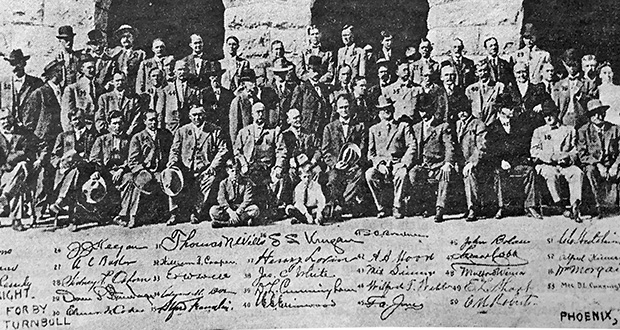In October of 1910, 52 Arizona delegates gathered in Phoenix to ratify a new Constitution that could then be submitted to the U.S. Congress for approval.
By Joe Pitts for Chamber Business News
(Editor’s note: Opinion pieces are published for discussion purposes only.)
Arizona is a special state, with a unique heritage. When we were founded in 1912, at the height of the American progressive movement, our state’s founding fathers built a dynamic Constitution.
In October of 1910, 52 Arizona delegates gathered in Phoenix to ratify a new Constitution that could then be submitted to the U.S. Congress for approval. Among the most powerful interests involved at the gathering were “both the Territorial Democratic Party and organized labor,” who joined forces to champion “direct legislation by the people.”
Among their most notable contributions to Arizona’s constitution were the “initiative, referendum, and recall measures,” which were built with the intent of putting Arizonans in the driver’s seat, brushing aside the special interests of the time: big banks, railroad companies, and corrupt politicians.
Ironically, in our time, the progressive policies put in place by our founders in the early 20th century have been warped and taken advantage of by out-of-state special interests.
Voter Protection Act
The Voter Protection Act, passed by voters into law in 1998, was advertised as — you guessed it — a set of protections that would shield Arizona voters from special interests. This translated to further restrictions on the elected governor and Legislature from amending or repealing statewide referendums, setting up a system that allowed initiatives to pass with little path for recourse or even minor amendment.
Since its passage, the Legislature’s hands have been tied when initiatives that duly-elected representatives of the people found troubling passed into law, even by the slimmest of margins. This has had a damaging effect on Arizona’s electoral system: every two to four years, initiatives have become life-or-death battles on big issues that could easily be misleadingly portrayed to the general public by big spenders.
Out-of-state special interests
Despite its broad progressive conception in the early 1900s, Arizona’s initiative process has transformed into the antithesis of its original intent.
In the age of digital advertising, global communications, and a truly international economy, out-of-state special interest groups have come to dominate Arizona’s system of direct democracy. At some point we must ask: direct democracy for whom?
Just this year it was revealed that just .7% (yes, point-seven percent) of the Yes on Proposition 208’s campaign contributions came from in-state individual Arizona donors. The largest union in America, the Washington D.C.-based National Education Association, gave nearly $8,000,000 to the campaign. A Portland, Oregon-based special interest called Stand for Children donated just over $9,000,000. The Open Society Foundation, the infamous George Soros-founded global special interest organization, gave over $500,000. They reported an annual revenue of $376,000,000 in 2018.
In 2018, Proposition 127, an initiative written in the mold of a California energy mandate that was projected to raise energy prices on working- and middle-class Arizonans, was pushed nearly entirely by California billionaire and 2020 Democrat Presidential candidate Tom Steyer.
Overall, his campaign spent $23,931,082.65 on the initiative, which eventually failed spectacularly. Another $39 million was expended by the No on 127 campaign so that Arizonans would be better educated on the truth about the measure.
The total spending on this race could’ve just as easily been spent on more productive ends, including the installation of at least 4,701 5kW solar panels, producing over 23,500kW of clean power.
“It’s notable that this initiative is anything but an Arizona product. This proposal is being forced on our voters by somebody who has no one’s interests in mind but his own,” Democrat state Representative Cesar Chavez said at the time. “He and his political strategists have created this initiative as a mirror image of a regulation already adopted in their home state. But I don’t believe a California plan is necessarily the right fit for Arizona.”
Reforming the process
Arizona’s initiative process as written is a ticket for out-of-state special interests to inject their influence into Arizona politics and make our state their policy playground. It has wasted tens of millions of dollars that could have been spent much more productively. The time is now for initiative process reform.
So what options are there? A recent paper published by the Arizona Junior Fellows explores some possibilities.
Arizona could reform the signature-collection process for initiatives, incorporating a geographic distribution requirement that ensures that all regions and parts of Arizona are properly incorporated into the process of getting initiatives on the ballot.
Simply canvassing metro Phoenix and metro Tucson frays relations between urban and rural interests, placing policies with statewide implications on the ballot without statewide buy-in.
We must also take a look at the minimum voter passage threshold. Currently it requires only 50%-plus-one (a simple majority) to institute sweeping legislation into law. Colorado requires a 55% threshold, Nevada requires a simple majority like Arizona but also a requirement that it must pass in two consecutive elections, and other states such as Florida, Illinois, Nebraska, and Massachusetts have differing but nonetheless more rigorous processes for passage.
Further, Arizona’s elected legislators could revisit allowing the Legislature to further amend and modify passed initiatives. This could be done by amending the Voter Protection Act, so that it takes a supermajority (75%) of legislators in both houses to properly amend a passed initiative. This would ensure that any amendments are broadly agreed upon.
Necessary bipartisan cooperation
Ultimately, this must be a bipartisan, coalition-building effort. We must seek a long-term solution that crosses party lines and puts Arizona voters first. We cannot afford to mirror the tactics that special interests have used to bring us to this point.
It’s time to reform our initiative process in this upcoming legislative session so that our state government truly reflects the will of Arizona voters, not billionaires and special interests.
Joe Pitts is the program director for Business Ballot and a student at Arizona State University.












